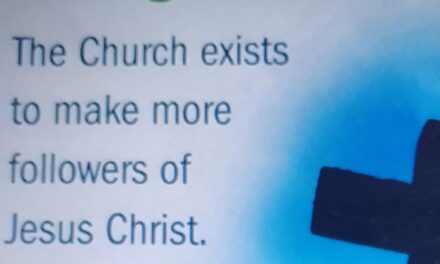But understand this, that in the last days there will come times of difficulty. For people will be lovers of self, lovers of money, proud, arrogant, abusive, disobedient to their parents, ungrateful, unholy, heartless, unappeasable, slanderous, without self-control, brutal, not loving good, treacherous, reckless, swollen with conceit, lovers of pleasure rather than lovers of God, having the appearance of godliness, but denying its power. Avoid such people – 2 Tim 3:1-5
We are in a very difficult time for Christian mission, service, marriage, parenting and most especially fathering. We are in the last days and culture characterised by sinfulness, divisions, pride, violence and immorality. The warning against the prevailing wicked human behaviour by Apostle Paul and his reference to the last days demands a missional sense of urgency. Paul’s descriptive list of behaviour in the last days, describes our society, even, unfortunately, many Christians. The truth is that, ‘there is a comfortableness about superficial Christianity that should cause us to be uncomfortable.’ Let us check the life we are living against the list, especially as fathers in the last days obsessed by sex. Every Christian celebrations summons us not to give in to society’s pressures and seductions. The Father’s Day celebration invites us to stand up against the last days obsessions by living faithfully as God would have his people live.
The three main dimensions of fathering – fatherhood, the transition from manhood to fatherhood and father involvement suggests a monumental task and essence of Father’s Day. Heinrich Arnold in his contribution on what makes a man, explained that, ‘a father is necessary to literally “make” a man, but you can be a man without being a father. Anatomy and physiology, parts and function, are an integral and defining aspect of maleness, but are not complete without the spirit of manhood. Testosterone and testicles are clearly crucial, but true manhood rules the testicles. When it is the other way around, then maleness becomes toxic.’ Fatherhood is a spiritual and foundational component of the church, societies, and nations because ‘being a father impacts men’s health and wellbeing and that of their family.’ The reflection is that manhood and womanhood are not only good as declared by God, they are beautiful, they are distinct, Godly, and necessary for not only for survival but for personal and corporate renewal and revival.
The spirituality, creativity, and sustaining strength of fatherhood beyond the power of control and dictatorship is about holy love just as God is holy and love. The question for our reflection is how should a father act just as God is holy and love bearing in mind that a culture and ‘a society obsessed by sex is poisonous’?
Father’s Day celebration reminds us that God-fearing parents are concerned that their children would walk in the truth of God’s Word. Father’s Day celebration therefore offers us another renewing opportunities and repentance bearing in mind that ‘a culture confused about sex is self-destructive.’ The corruption of the last days and seductive culture points to ‘all kinds of sin in thought, word, deed, attitude, and affection.’ The last days gross defilement resonates with how corrupt and quickly all of humanity forgot about God; ‘The Lord saw that the wickedness of man was great in the earth, and that every intention of the thoughts of his heart was only evil continually. . . .Now the earth was corrupt in God’s sight, and the earth was filled with violence. And God saw the earth, and behold, it was corrupt, for all flesh had corrupted their way on the earth’ (Gen 6:5, 11-12).
Fathering in the last days and culture obsessed by sex summons us as Christian fathers to take heed and pay attention to our own example bearing in mind Paul’s exhortation to Timothy, “Keep a close watch on yourself and on the teaching. Persist in this, for by so doing you will save both yourself and your hearers” (1 Tim 4:16). The next generation need salvation and deliverance so as not to mix Christianity with the seductions of the secular culture.
Fathering in the last days obsessed by sex fundamentally is not a social construction where each generation or government redefines its cultural concept and ideal of fathers or mothers according to its own time and conditions. The theological understanding of fathering in holiness and love could help to overcome the emerging gap created by the social constructionist idea of ‘culture’ of fatherhood and the ‘conduct’ of fathers in families. Social and political conditions could change, God’s standard never change (Heb 13:8). The culture and conduct or roles of a father according to the Dictionary of the New Testament theology could be very helpful in reclaiming the theological importance of fathering. Fathering is a divine blessing rather than advocacy product of beliefs, motivations, attitudes and behaviours of all stakeholders in the lives of children (Gen 27). HAPPY RENEWING FATHER’S DAY.











Recent Comments